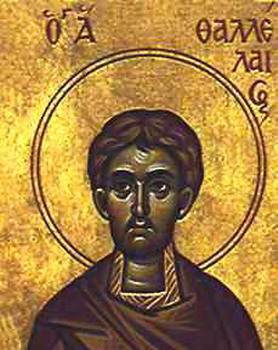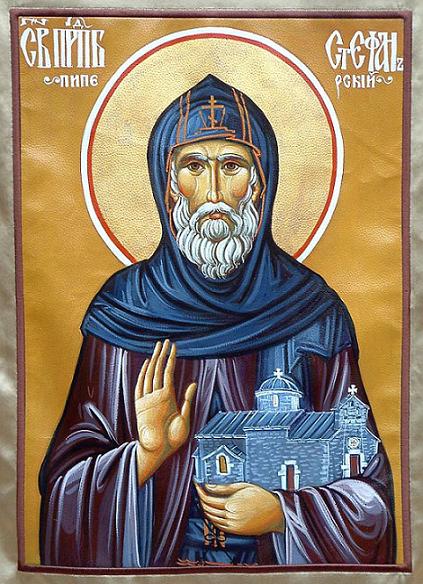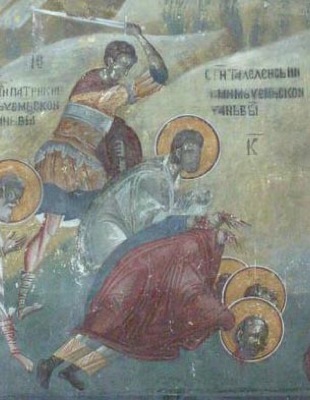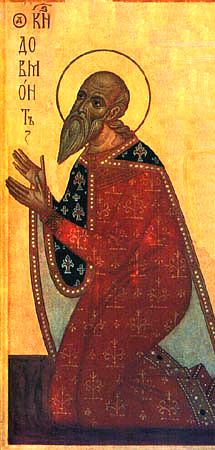|
|
The Holy Martyr Thaleleus Born in Lebanon, his father's name being Berucius and his mother's Romylia, he was an eighteen-year-old youth, handsome and wellgrown and with ginger hair. A doctor by profession, he suffered for Christ in the reign of Numerian. When he courageously confessed his faith in Christ the Lord before the judge, the latter commanded the two executioners, Alexander and Asterius, to bore through his knees, pass a rope through the pierced bone and hang him from a tree. But the executioners, as though the unseen power of God had deprived them of sight, bored through a plank and hung it on the tree. When the judge discovered this, he thought that the executioners had done it deliberately, and ordered that they be flogged. Then Alexander and Asterius cried out under the flogging: 'The Lord is alive to us; from now on, we are become Christians. We believe in Christ, and suffer for Him.' Hearing this, the judge ordered that they be beheaded. Then the judge took the awl, to bore through Thaleleus's knees himself, but his hand was paralysed and he had to ask Thaleleus to heal him, which the kindly martyr, with Christ's aid, did by his prayers. Then he was thrown into water, but showed himself alive to the judge (for Thaleleus was praying within himself that God would not have him die at once, but would let his tortures continue). When he was thrown to the wild beasts, they licked his feet and rubbed tamely round him. He was finally beheaded and entered into eternal life in 284. Born in Lebanon, his father's name being Berucius and his mother's Romylia, he was an eighteen-year-old youth, handsome and wellgrown and with ginger hair. A doctor by profession, he suffered for Christ in the reign of Numerian. When he courageously confessed his faith in Christ the Lord before the judge, the latter commanded the two executioners, Alexander and Asterius, to bore through his knees, pass a rope through the pierced bone and hang him from a tree. But the executioners, as though the unseen power of God had deprived them of sight, bored through a plank and hung it on the tree. When the judge discovered this, he thought that the executioners had done it deliberately, and ordered that they be flogged. Then Alexander and Asterius cried out under the flogging: 'The Lord is alive to us; from now on, we are become Christians. We believe in Christ, and suffer for Him.' Hearing this, the judge ordered that they be beheaded. Then the judge took the awl, to bore through Thaleleus's knees himself, but his hand was paralysed and he had to ask Thaleleus to heal him, which the kindly martyr, with Christ's aid, did by his prayers. Then he was thrown into water, but showed himself alive to the judge (for Thaleleus was praying within himself that God would not have him die at once, but would let his tortures continue). When he was thrown to the wild beasts, they licked his feet and rubbed tamely round him. He was finally beheaded and entered into eternal life in 284.The Holy Martyr AsclasHe suffered in Antionus, a town in Egypt, in the time of Diocletian. He was flogged, flayed and burned with torches, but remained to the end steadfast in the Faith. When the torturer, Arrianus, was crossing the Nile by boat, Asclas, by his prayers, stopped the boat and would not let it move again until Arrianus had put in writing that he believed in Christ as the one, almighty God. But, dismissing that wonder as magic, Arrianus the torturer forgot all that he had written and continued to torture the man of God even more harshly. At last, Asclas had a stone tied around his neck and he was thrown into the Nile. But, on the third day, Christians found his body on the bank, with the stone still round his neck (as the martyr had foretold to them before his death), and gave him burial, in 287. The holy martyr Leonidas suffered together with him. Their torturer, Arrianus, repented later, came to believe in Christ with his whole heart and began to proclaim his faith publicly before the heathen. They then killed him also; and thus Arrianus, the sometime torturer of Christians, became worthy of the martyr"s wreath for Christ.
Our Holy Father Stephen of Piperi This saint was of the tribe of Niksic, from the village of Zupa, of poor and devout parents, Radoje and Yacima. To learn the ascetic life, he lived first in the monastery of Moraca, where he became abbot. The Turks drove him out of there, and he settled in Rovaski Turmanj, in the place now called Celiste. After that, he moved again and settled in a cell at Piperi, where he remained to his death in toil and godly asceticism. He entered peacefully into rest in the Lord on May 20th, 1697. His relics are preserved there to this day, and glorify Christ our God and Stephen the man of God by their many wonders. This saint was of the tribe of Niksic, from the village of Zupa, of poor and devout parents, Radoje and Yacima. To learn the ascetic life, he lived first in the monastery of Moraca, where he became abbot. The Turks drove him out of there, and he settled in Rovaski Turmanj, in the place now called Celiste. After that, he moved again and settled in a cell at Piperi, where he remained to his death in toil and godly asceticism. He entered peacefully into rest in the Lord on May 20th, 1697. His relics are preserved there to this day, and glorify Christ our God and Stephen the man of God by their many wonders.Venerables Nicetas, John, and Joseph, monks, of Chios (1050)Martyrs Alexander and Asterius (284) The Martyrs Thalaleas, Alexander and Asterias: During the reign of Numerian (283-284), the governor of the city of Aegea dispatched soldiers to seek out Christians. They brought to him Thalaleas, an 18 year old blond-haired youth. To the governor's interrogation Saint Thalaleas answered: "I am a Christian, a native of Lebanon. My father, by the name of Beruchius, was a military commander, and my mother was named Romilia. My brother has the dignity of sub-deacon. I however am a student of medicine under the physician Makarios. During a former time of persecution against Christians in Lebanon I was brought before the governor Tiberias, and just barely escaped execution. But now I stand before this court, do with me what thou dost wish. I desire to die for Christ the Saviour and my God, hoping from Him help to endure all torments"... The Martyrs Thalaleas, Alexander and Asterias: During the reign of Numerian (283-284), the governor of the city of Aegea dispatched soldiers to seek out Christians. They brought to him Thalaleas, an 18 year old blond-haired youth. To the governor's interrogation Saint Thalaleas answered: "I am a Christian, a native of Lebanon. My father, by the name of Beruchius, was a military commander, and my mother was named Romilia. My brother has the dignity of sub-deacon. I however am a student of medicine under the physician Makarios. During a former time of persecution against Christians in Lebanon I was brought before the governor Tiberias, and just barely escaped execution. But now I stand before this court, do with me what thou dost wish. I desire to die for Christ the Saviour and my God, hoping from Him help to endure all torments"...Venerable Thalassius the Myrrh-giver of Libya (ca. 660) The Monk Thalassios, head of a monastery in Libeia, pursued asceticism during the VII Century. He was a friend of Saint Maximos the Confessor (Comm. 21 January), with whom for many years he corresponded. The holy ascetics, as their letters testify, addressed themselves to dealing with difficulties in the spiritual life. The Monk Thalassios, well versed in Holy Scripture, combined deep knowledge with the spiritual enlightenment of believers. He expounded his theological positions under the guise of instructive aphorisms in his work, "On Love, Temperance and the Spiritual Life". The composition of Abba Thalassios consists of 400 chapters, each of which is written in the form of an acrostic, which evidences the obvious literary talent of the author. In this composition, together with spiritual ethics there are stated questions of dogmatic character: concerning the Incarnation of God the Word, and concerning the redemption of mankind... The Monk Thalassios, head of a monastery in Libeia, pursued asceticism during the VII Century. He was a friend of Saint Maximos the Confessor (Comm. 21 January), with whom for many years he corresponded. The holy ascetics, as their letters testify, addressed themselves to dealing with difficulties in the spiritual life. The Monk Thalassios, well versed in Holy Scripture, combined deep knowledge with the spiritual enlightenment of believers. He expounded his theological positions under the guise of instructive aphorisms in his work, "On Love, Temperance and the Spiritual Life". The composition of Abba Thalassios consists of 400 chapters, each of which is written in the form of an acrostic, which evidences the obvious literary talent of the author. In this composition, together with spiritual ethics there are stated questions of dogmatic character: concerning the Incarnation of God the Word, and concerning the redemption of mankind...St. Mark hermit
St. Dovmont-Timothy, prince of Pskov (1299) The Holy Nobleborn Prince Dovmont (Domant) of Pskov, prince of Nal'shinaisk (Nal'shensk), was a native of Lithuania, and at first he zealously professed paganism. In 1265, escaping from internecine strife amongst the Lithuanian princes, he was forced to flee Lithuania and with 300 families he arrived in Pskov. The land of Pskov became his second native-country. Here, in the expression of the chronicler, "the grace of God was breathed upon him", when with all his retainers he accepted Holy Baptism with the name Timothei (Timophei) and was bestown the great gifts of the Lord. Within a year's time, the people of Pskov chose him as their prince for his bravery and his true Christian virtues... The Holy Nobleborn Prince Dovmont (Domant) of Pskov, prince of Nal'shinaisk (Nal'shensk), was a native of Lithuania, and at first he zealously professed paganism. In 1265, escaping from internecine strife amongst the Lithuanian princes, he was forced to flee Lithuania and with 300 families he arrived in Pskov. The land of Pskov became his second native-country. Here, in the expression of the chronicler, "the grace of God was breathed upon him", when with all his retainers he accepted Holy Baptism with the name Timothei (Timophei) and was bestown the great gifts of the Lord. Within a year's time, the people of Pskov chose him as their prince for his bravery and his true Christian virtues... |